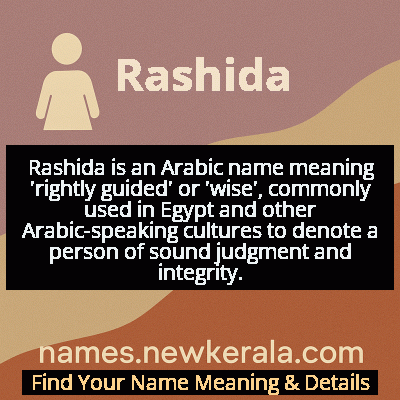Rashida Name Meaning & Details
Origin, Popularity, Numerology Analysis & Name Meaning of Rashida
Discover the origin, meaning, and cultural significance of the name RASHIDA. Delve into its historical roots and explore the lasting impact it has had on communities and traditions.
Name
Rashida
Gender
Female
Origin
Egyptian
Lucky Number
6
Meaning of the Name - Rashida
Rashida is an Arabic name meaning 'rightly guided' or 'wise', commonly used in Egypt and other Arabic-speaking cultures to denote a person of sound judgment and integrity.
Rashida - Complete Numerology Analysis
Your Numerology Number
Based on Pythagorean Numerology System
Ruling Planet
Venus
Positive Nature
Harmonious, responsible, caring, and artistic.
Negative Traits
Overly idealistic, superficial, possessive, or jealous.
Lucky Colours
Pink, turquoise.
Lucky Days
Friday.
Lucky Stones
Diamond, turquoise.
Harmony Numbers
2, 3, 9.
Best Suited Professions
Artists, musicians, teachers, healthcare workers.
What People Like About You
Warmth, nurturing nature, artistic flair.
Famous People Named Rashida
Rashida Jones
Actress, Writer, Producer
Starred in 'Parks and Recreation', wrote 'Toy Story 4', and advocates for social justice causes
Rashida Tlaib
U.S. Congresswoman
First Palestinian-American woman in Congress and one of the first Muslim women elected to the U.S. House of Representatives
Rashida Juma
Tanzanian Businesswoman
Founder of Jumapili Ltd. and prominent advocate for women's entrepreneurship in East Africa
Rashida Dohad
Pakistani Education Reformer
Executive Director of Orange Tree Foundation, working to transform education systems in Pakistan
Name Variations & International Equivalents
Click on blue names to explore their detailed meanings. Gray names with will be available soon.
Cultural & Historical Significance
During Egypt's Islamic golden age, the name gained particular prominence when scholarly and spiritually-guided women were highly respected in society. The name reflects the cultural importance placed on righteousness and proper guidance in Egyptian-Islamic tradition. In modern Egypt, Rashida continues to symbolize the ideal of the educated, morally-grounded woman who contributes positively to her community while maintaining strong cultural and religious values. The name's enduring popularity across generations demonstrates its deep cultural resonance and the continued importance of its core meaning in Egyptian society.
Extended Personality Analysis
Women named Rashida are typically perceived as possessing strong moral compasses and natural leadership qualities. They often exhibit wisdom beyond their years, with a calm, thoughtful demeanor that inspires confidence in others. Rashidas tend to be deeply principled individuals who stand firmly for what they believe is right, sometimes displaying remarkable courage in defending their convictions. Their guidance is often sought in difficult situations due to their reputation for fairness and sound judgment.
Many Rashidas demonstrate exceptional organizational skills and methodical approaches to problem-solving, combined with genuine empathy that makes them effective mediators and community builders. They typically balance traditional values with progressive thinking, creating bridges between different generations and perspectives while maintaining their core ethical standards. While they can be determined and persistent in pursuing their goals, Rashidas usually approach challenges with diplomacy and grace. Their strength often lies in their ability to remain composed under pressure and their commitment to finding equitable solutions that respect all parties involved. The combination of intellectual sharpness and emotional intelligence makes Rashidas particularly effective in roles requiring both strategic thinking and human understanding.
Modern Usage & Popularity
In contemporary times, Rashida has maintained steady popularity across the Muslim world while gaining increased recognition in Western countries through prominent figures like Rashida Jones and Rashida Tlaib. The name enjoys particular popularity in Egypt, where it ranks among the top 100 female names, and in other Arab nations like Saudi Arabia, Jordan, and the UAE. In the United States, the name saw a significant boost in usage following Rashida Jones' rise to fame in the 2000s, with the Social Security Administration recording increased registrations, particularly in diverse urban centers. Modern Rashidas often balance traditional cultural values with contemporary careers, frequently excelling in law, education, healthcare, and social activism. The name's appeal lies in its beautiful meaning combined with its sophisticated, international sound that works well across cultural contexts. Recent years have shown a trend toward using Rashida as both a first name and middle name, often paired with more modern or Western names to create balanced cultural identities.
Symbolic & Spiritual Meanings
Symbolically, Rashida represents the journey toward truth and moral clarity. The name embodies the concept of divine guidance and the human aspiration to live according to higher principles. In metaphorical terms, Rashida signifies a beacon or compass - someone who not only finds the right path themselves but illuminates the way for others. The name carries connotations of integrity, wisdom, and spiritual alignment, suggesting an individual who serves as a moral anchor in turbulent times. In many cultures, the name is associated with light and direction, much like a lighthouse guiding ships through darkness. It also symbolizes the balance between tradition and progress, representing individuals who honor their heritage while moving confidently toward the future. The name's essence suggests someone who transforms challenges into opportunities for growth and enlightenment, serving as a living embodiment of the principle that true guidance comes from aligning one's actions with ethical truth and compassionate understanding.

